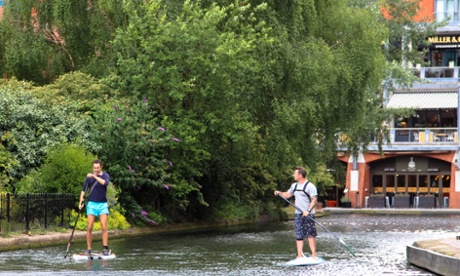
“There just weren’t any waves in the Midlands,” says Chris Kenyon.
Fortunately for this Brummie surfer, he stumbled across paddleboarding a decade ago. The sport is a curious one: you balance on top of a monster surfboard and use a large paddle to power along. More curious still is Chris’s area of exploration. It’s not around the islands of Croatia, nor in paddleboarding’s spiritual home of Hawaii; the Midlander has made a full-time job of paddling the canal system that links contemporary Birmingham with its industrial past.
Chris asks me to step onto a board that’s floating slowly towards Winson Green prison, and I’m protected only by a pair of Bermuda shorts. We start with practice strokes atop the paddleboard; while it may take a week to learn the rudiments of surfing, in just 10 minutes Chris and I are navigating the waterway towards the city centre a mile away.
In this part of Britain’s former industrial heartland, there’s an added incentive not to fall in. We spy two dead fish and one bag of Doritos in quick succession. “Keep your mouth shut if you tumble,” says Chris. Has anyone ever fallen in? “I lead a lot of team-building groups through here. One big chap hit a submerged trolley and he flew forward into the drink. It’s an occupational hazard.”
Yet the appeal of such urban exploration becomes apparent as we paddle on through Birmingham’s suburbs. Waterways infrequently used in the decades since road and rail replaced these industrial arteries lead off from the principal Birmingham Canal. Towpaths are bordered by floating pennywort weed. Factories have birds nesting in the eaves. This city centre silence is nothing, claims Chris. “When I lead an expedition past the new Mailbox [shopping centre] and Birmingham Library, or to Spitfire Island where fighter planes were manufactured at Castle Bromwich, we might be the only ones on the water”.
These Midland waterways will become busier if Chris gets his way. Urban paddleboarding has become so popular that he recently attended a jamboree of 100 boarders organised by Canoe England alongside Birmingham’s Broad Street, where the handprints of local stars such as Noddy Holder and Jasper Carrot have been cast in cement à la Hollywood. “Colleagues from other paddleboard schools like London’s Blue Chip and Bournemouth’s BaySUP drive up to Midlands meets,” says Chris. “Although, in theory, they could have paddled up, as Birmingham is connected to both Paddington Basin, and the Thames and Severn Canal.”
However, Birmingham paddleboarding’s popularity had less than auspicious beginnings. “I first tried my new kit on an artificial lake near a leisure centre in Tamworth,” says Chris. The local fishing club bailiff quickly emerged to apprehend both man and board. Fortunately, when Chris called the council to clarify his navigation rights, luck was on his side. “My local councillor was a big surfer,” he says. “He found me a grant to teach the sport to locals aged between eight and 80.” Since 2012, some 500 paddleboarders have passed through Chris’s class.
My final lesson is to navigate into Sherborne Wharf marina. A symbol of the Midlands’ resurgent waterways, it’s full of barges, cafes and the odd heckler (“No sharks in ‘ere mate.”). I shake Chris’s hand and make for New Street station and home. He lugs his paddleboard to an adjoining lock – where there are another 100 miles of Birmingham canals to explore.
• Chris Kenyon runs the ASI-accredited Central SUP paddleboard club. Private waterways tours and paddleboard lessons cost £20 an hour
FOUR MORE UK ADVENTURE ACTIVITIES IN UNUSUAL PLACES
Inland surfing, Wales
Fancy a surf? Head to the coast. Or don’t … thanks to a brand new inland surfing lake in Snowdonia that lets you hone your skills on artificial waves. Opened in August, the lake churns out 18 perfectly formed waves (up to two metres high) an hour, providing the perfect environment to improve your surfing. And though the lagoon is artificial, the surroundings – forest coated hills of the Conwy valley – satisfy a taste for the outdoors.
• Childrens’ lessons (5-13) start at £29 for one hour; 14-17 years and adult two-hour sessions (one hour theory, one hour practice) are £39. Beginners can freesurf from £19 an hour, surfsnowdonia.co.uk
Indoor ice-climbing, Scotland
Like stepping inside a “big fridge” – according to the testimonial of leading climber Dave Macleod – the Ice Factor in Kinlochleven is home to the biggest ice-climbing wall in the world. With 400 tonnes of real snow and ice packed onto a 12-metre wall, it’s an incredible (and rare) place for climbers ranging from beginner to expert to develop the specific techniques required for this style of climbing.
• Taster sessions £30 adult, £25 child, ice-factor.co.uk
Abseil the Orbit, London
There aren’t any cliffs or mountains in London, but the capital does have the UK’s tallest sculpture: the Orbit. And now the 262ft structure in the Olympic Park has become a magnet for adrenaline junkies, offering the chance to abseil from the top. During the freefall abseil you’ll enjoy views across London, with the Gherkin, St Paul’s Cathedral and Wembley Stadium all visible.
• Over 18s only, £85, arcelormittalorbit.com
Urban white-water rafting, Glasgow
Experience river rapids barely a mile from Glasgow’s city centre, at Pinkston Watersports, Scotland’s only artificial white-water course. A legacy project from the 2014 Commonwealth Games, the centre has a rapids route you can navigate in a canoe, on a bodyboard or with a group of pals in a six-person inflatable raft.
• Activity prices vary, see outdoorpursuitsscotland.co.uk

